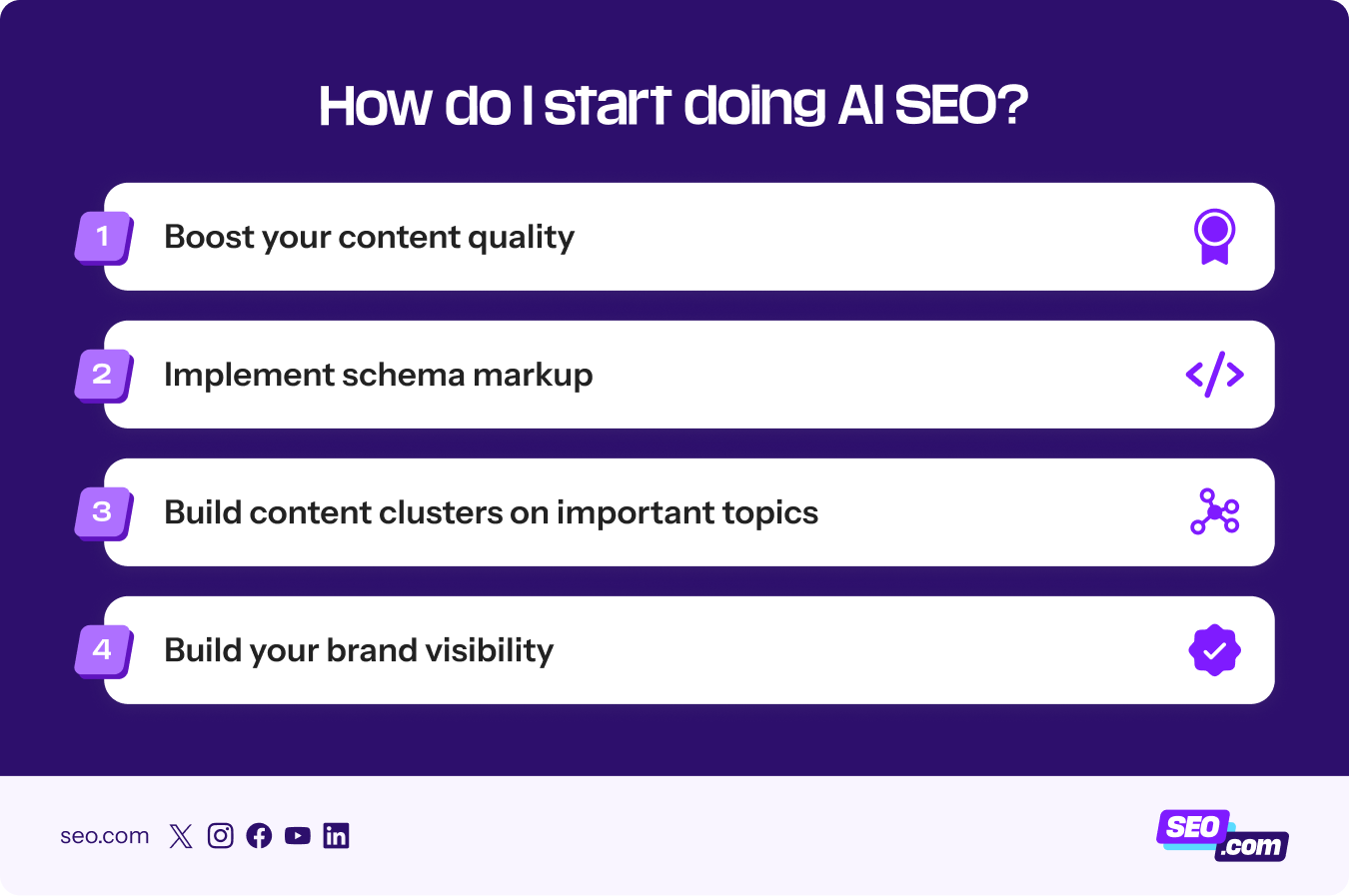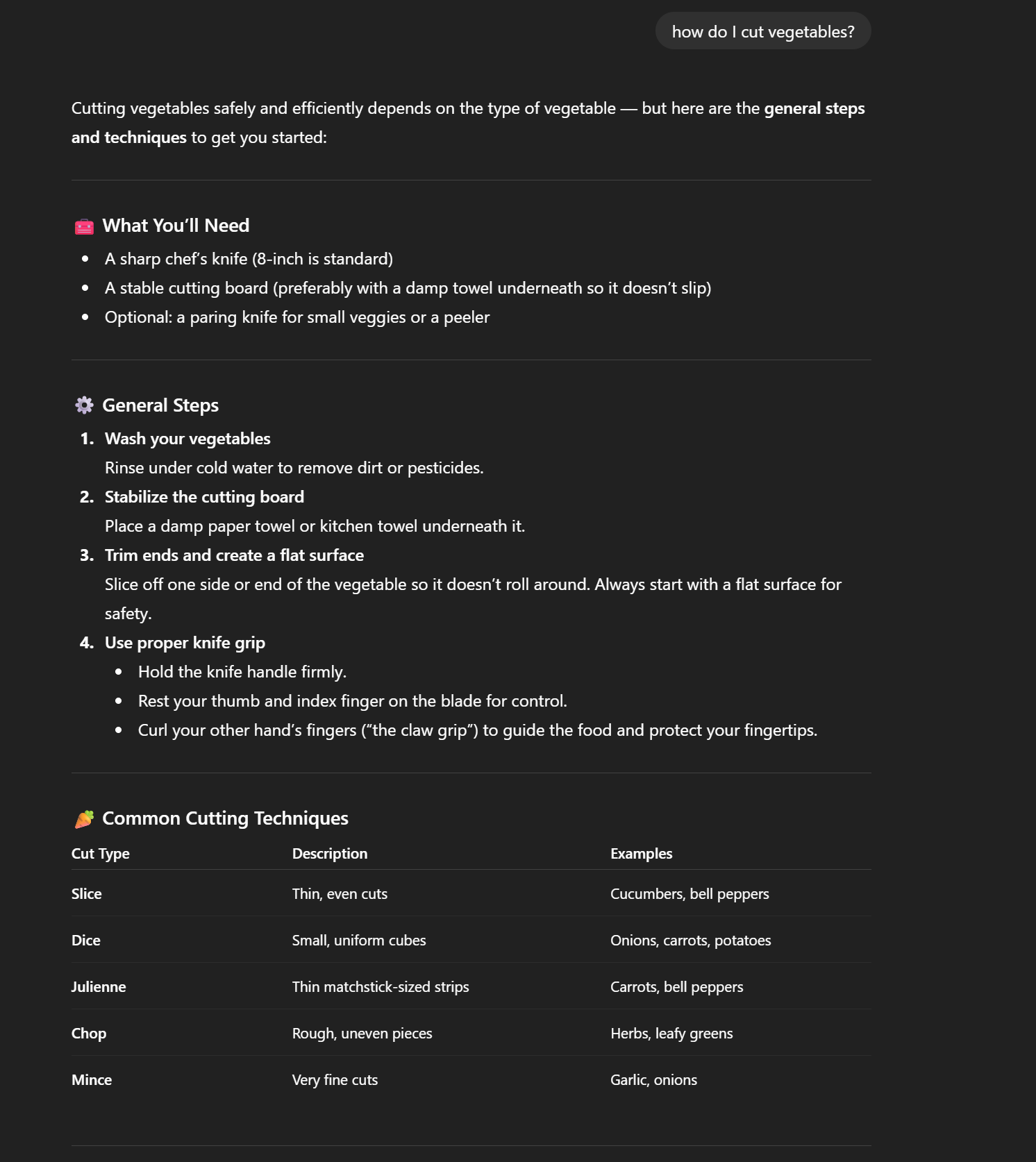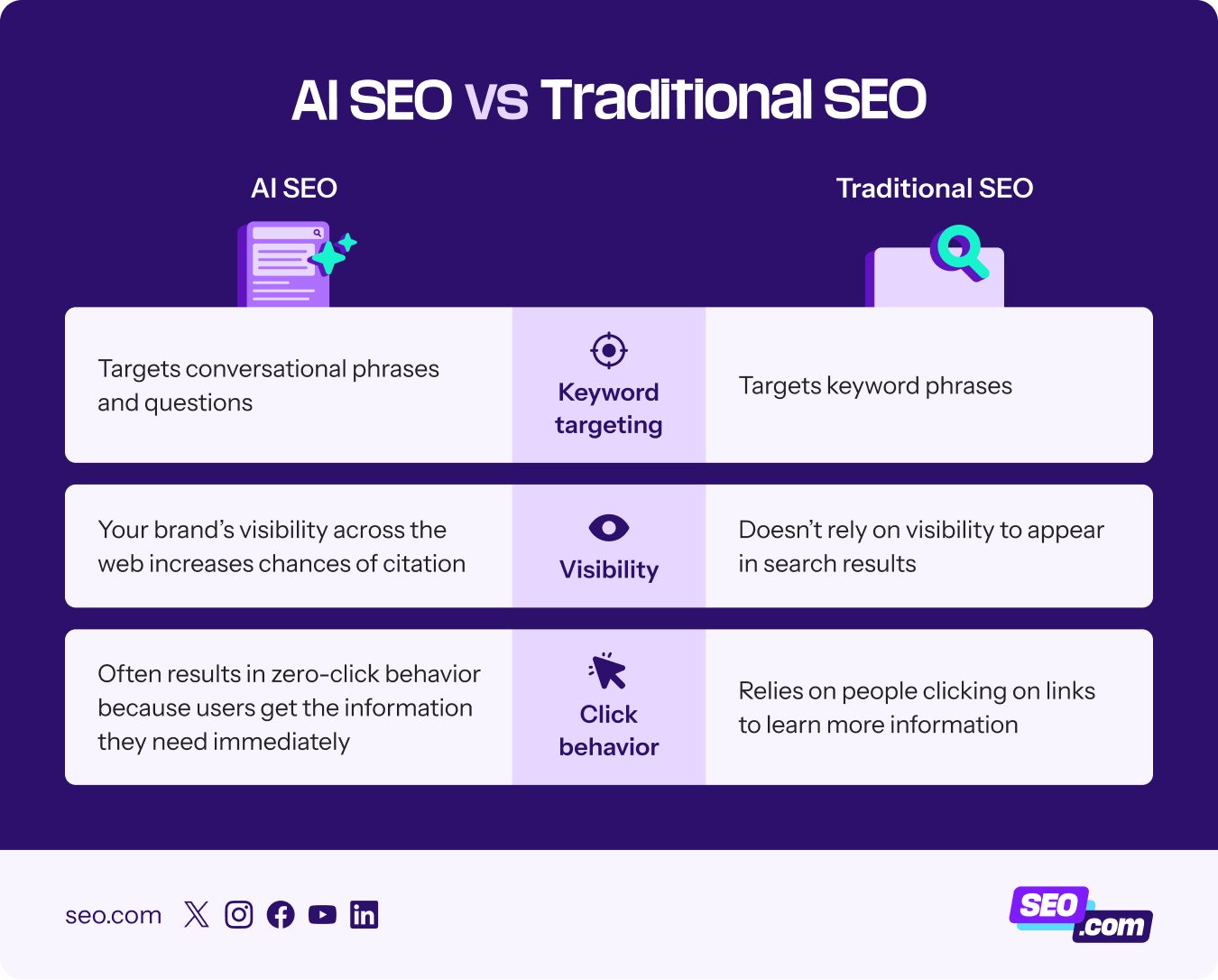- Why is AI SEO necessary for businesses today? AI SEO is crucial because audiences are shifting how they search, using platforms like ChatGPT, Google’s AI Overviews, Perplexity, and other AI search engines instead of only traditional search engines, requiring businesses to optimize specifically for these new channels.
- How does AI search differ from traditional search engines? AI search engines aggregate information and present summarized responses directly to users without requiring clicks, while traditional search engines provide lists of blue links that users must click through and investigate to find answers.
- What role does content quality play in AI SEO? High-quality, unique content that offers original insights, expert perspectives, or original data gives AI search engines a reason to cite your page over competitors, since AI engines prioritize sources that bring something new to the conversation rather than repeating existing information.
- Why are content clusters important for AI SEO? Content clusters help increase citation chances because AI search engines consult multiple sources and anticipate user needs, so covering multiple subtopics around a main theme expands your coverage and increases opportunities to appear in AI-generated responses and follow-up queries.
- How does brand visibility impact AI search rankings? AI engines prioritize citing trustworthy and authoritative brands that are frequently mentioned across the web, making brand visibility—through quality content, aggregate page mentions, and optimized profiles—a major differentiator between AI SEO and traditional SEO strategies.
Navigating AI search right now feels like you’re a clumsy dog trying to compete in a show competition.
Instead of gracefully weaving through the poles, you’re running into each one and getting stuck.
Instead of running through the tunnel the right way, you’re going the wrong way and have to turn around to go back the other way.
Instead of clearing the hurdles, you keep getting tripped up.
Sound familiar?
And then, in the end, you’re still left wondering: Is this even worth it? Do I need AI SEO?
I’m here to tell you that, yes, you need AI SEO. It’s crucial for helping your search strategy stay effective and for keeping your business competitive.
So, let me be your trainer — I’ll walk you through the reasons why you need AI SEO and how you can start optimizing your search strategy for it, so you can be the SEO “show dog” that takes home the ribbon.
Jump to what you want to read:
Do I need AI SEO?
Yes, you need AI SEO if you want to succeed in today’s search landscape.

Here are the three big reasons why you’ll want to start investing in AI SEO:
Your audience is shifting the way they search
At the end of the day, your ultimate goal is to reach your audience where they’re searching. Previously, that meant just Google or Bing. Now, it includes AI search too.
Your audience is getting information from:
- Google’s AI Overviews
- ChatGPT
- Gemini
- Perplexity
- AI Mode
- Claude
- Copilot
- and more!
So, if you’re not optimizing to appear in these AI search engines, you’re missing an opportunity to reach your audience. And having a strong SEO strategy isn’t enough — it certainly helps, but it doesn’t maximize your opportunities to appear in AI search results.
So, since people are shifting the way they search, your strategy needs to shift with it.
Optimizing for AI search is different
As I hinted to earlier, having a strong SEO strategy is helpful, but you need more than that. That’s why AI SEO is an important investment — it helps you optimize specifically for AI search engines and how they operate.
Keep in mind that LLMs don’t operate like traditional search engines.
Traditional search engines deliver a list of blue links relevant to the keywords you’re searching. You can have to click on the links that look most relevant/helpful to your query and read through the page to get the answer you need.
AI search engines, on the other hand, aggregate all the information and present it in one summarized response. Sometimes the information is pulled from its dataset, while other times it performs a search for you (about 31% of prompts).
Regardless, it’s serving the information directly to the user, without them having to click links and investigate. And on top of that, people are often searching more elaborate queries, which calls for more detailed responses.
The point being, the experience and output with AI search is different from traditional search. While a lot of basic SEO principles apply, there are additional optimization needed to help you perform well in AI search, which is where AI SEO helps.
Your competitors are already preparing for it
I’m going to hit you with a cold, hard fact right out the gate: 87% of businesses already invest in or plan to invest in AI SEO. Your competition is likely already thinking about investing in AI SEO or has already started optimizing their strategy. That means, if you forego it, you’ll fall behind your competition.
Investing in AI SEO helps you stay competitive, while also continuing to meet your audience where they’re at.
How do I start doing AI SEO?

Okay, so you know you need to start optimizing for AI search… but that begs the question: Where do you start? How do you go from a clumsy dog to a prize-winning show dog?
As your unofficial (AI SEO) trainer, here are the fundamentals to start with:
1. Boost your content quality
The first hurdle you need to learn to jump is the content quality hurdle.
Many businesses adopted the practice of creating content exactly like others create it because that’s what was ranking. But realistically, it just creates a bunch of blog posts all saying the same thing.
So what incentive do people have to pick your content over the competition, if it’s all alike?
It’s the same with AI search. AI search engines don’t have incentive to cite your page over another because it’s all the same. But if you’re bringing something new to the table, you’re giving AI search engines a reason to cite you because, well, you have something interesting to add to the conversation!
So, focusing on how you can boost your website’s content quality is a great way for you to enhance the value of your content, so you’re more likely to get cited.
Here are some ways you can make your content more unique:
- Offer original insights from your expert team that enhance the information on your page
- Integrate original data to enhance your page’s validity
- Take a unique angle or perspective on a topic that others aren’t addressing
2. Implement schema markup
Another core component of AI SEO is weaving through the poles of schema markup. Schema markup, also known as structured data, is extremely helpful for enabling AI search crawlers to understand what information is on your website and how it’s relevant.
There are numerous types of schema you can implement, depending upon your page and the information on the page. Some common types include:
- Article
- Local Business
- Organization
- Product
- Service
- FAQ
- Video Object
- HowTo
- Review
- DefinedTerm
- Item List
You can use more than one type of schema to ensure that AI engines have additional context about your pages.
Not sure how to start? Check out our blog post on how to add schema markup.
3. Build content clusters on important topics
Creating content clusters is going to be a key component of a successful AI SEO strategy.
But why?
Here’s a little background about AI search engines: When a user conducts a query, the engine isn’t just consulting one source to get the information. It’s consulting multiple sources on the topic, with some of them being different (but relevant) pages from the same source.
Additionally, AI search engines are anticipatory — they try to predict what information a user wants (even if they didn’t specify it) based on what they searched. That means going to additional sources to get that information.
So, let’s say someone searches “how do I cut vegetables?” on an AI search engine. That AI engine is going to look at multiple sources to pull out all the information someone might want when searching that query.

So, for this particular query, the information included in the results was things like:
- What supplies you need to start cutting
- General steps on how to cut vegetables
- Common cutting techniques
- An example of how to cut a specific vegetable
- Safety tips
As you can see, the AI engine provided a lot of information it anticipated the searcher would need to know for the query. Even though the searcher didn’t ask for safety tips, for example, the AI engine anticipated the user would want to know them.
AI provided a lot of information. And this is just one query.
Many people will ask follow-up questions and continue getting information from the AI engine.
This is where content clusters become your blue ribbon.
With content clusters, you focus on creating content around certain topics to help you expand your coverage on relevant topics.
If you had a content cluster where your main topic was “cutting vegetables,” you may cover topics like:
- Why using specific vegetable cuts matters
- Tools for cutting vegetables
- Types of vegetable cuts
- Specific guides on cutting each type of vegetable (e.g. “How to cut onions,” “How to cut peppers”)
- Safety tips for cutting vegetables (common mishaps and how to prevent them)
By covering multiple subtopics about your topics, you expand your coverage of a topic and help increase your chances of being cited in AI search results.
4. Build your brand visibility
Brand visibility is a major component of AI SEO, and one big area where AI SEO differs from traditional SEO. AI engines prioritize citing trustworthy and authoritative brands that are frequently mentioned across the web. So, increasing your brand’s visibility across the web is a crucial component to AI SEO.
One way you can build brand visibility is just by creating good content (which I mentioned above). High-quality content will naturally earn mentions and backlinks, and will also appear as trustworthy to AI engines. So, creating content with those unique angles I mentioned earlier can be helpful for getting your brand visible in searches.
Additionally, getting your brand mentioned on any aggregate pages can be helpful too. If you’re a commercial kitchen supply company, for example, getting your ovens mentioned on a list of “top commercial kitchen ovens” is a great way to increase brand visibility.
You can also optimize your owned profiles, like your Google Business Profile, to help increase your visibility.
FAQs on AI SEO
Got questions about AI SEO? We’ve got answers!
How is AI SEO different from traditional SEO?

AI SEO does use some of the basic principles of traditional SEO, but there are a few areas where it differs from traditional search optimization:
- Keyword targeting: AI SEO focuses more on targeting conversational phrases and questions vs. keyword phrases. Instead of targeting something like “best cheap kitchen knives,” AI SEO would involve targeting a phrase like “What is the best brand of kitchen knives that aren’t too expensive?”
- Visibility: A big difference between traditional and AI SEO is the shifted focus on visibility. With AI search, you’re focused on boosting your brand’s visibility across the web to increase chances of citation. Traditional search doesn’t rely on visibility to appear in search results.
- Click behavior: AI search often results in zero-click behavior because users get the information they need immediately. Traditional search, on the other hand, relies on people clicking on links to learn more information.
What industries benefit most from AI SEO?
All industries can benefit from having an AI SEO strategy! But some industries will see greater shifts and impacts from AI search, including industries like:
- Healthcare
- Finance
- Education
- Manufacturing
- Tech
Basically, industries that are information heavy or have complicated concepts to explain will see more people turning to AI search engines to help them make sense of things.
What tools can I use to help with AI SEO?
AI SEO tools are great for helping you manage and track your presence in AI search engines. Some tools can help you in specific areas (content creation, keyword research, etc.), while others can be used specifically for tracking.
Here are some tools you can try:
To see a full list of tools, check out our blog post on the top AI SEO tools.
Launch your AI SEO strategy today
Don’t wait to start performing better in AI search results — build your AI SEO strategy so you can keep pace with your competitors (and even get ahead of them!)
If you aren’t sure how to execute your AI SEO strategy or need some help, WebFX (the team behind SEO.com) can create a custom strategy for you! Connect with us today to learn about our AI SEO services!

Future-Proof Your SEO Strategy with OmniSEO®
Goodbye search engine optimization, hello search everywhere optimization.



Future-Proof Your SEO Strategy with OmniSEO®
Goodbye search engine optimization, hello search everywhere optimization.

Future-Proof Your SEO Strategy with OmniSEO®
Goodbye search engine optimization, hello search everywhere optimization.
What to read next
- Feb 03, 2026
- 3 min. read
- Jan 22, 2026
- 7 min. read



